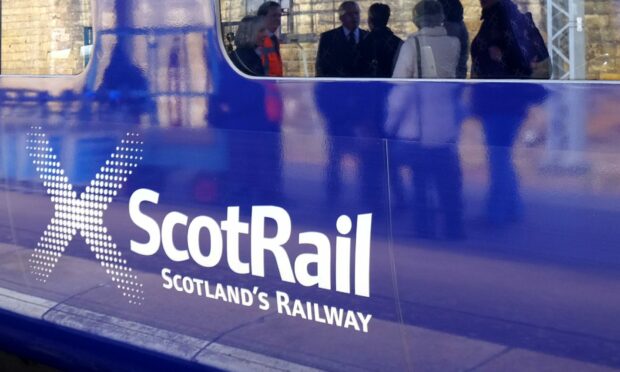Business chiefs have described ScotRail’s temporary reduced timetables as a “hammer-blow” and “headache” for companies across the north and north-east as well as for their staff and customers.
Up to 700 train services have been slashed and key routes are finishing hours earlier than normal.
Concerns centre around employees who normally travel by train being unable to get home after finishing work and the extra cost of another means of transport being picked up by firms only adds on more financial pressure.
Leading figures in the business industry are urging everyone involved in the dispute to come up with a solution as soon as possible.
New ScotRail timetable leaves Aberdeen ‘stranded’
Aberdeen Grampian Chamber of Commerce policy adviser Fergus Mutch said: “These measures effectively leave Aberdeen stranded – completely cut off by rail from early evening.
“It’s bad news for commuters, for visitors to the region as peak tourist season starts and a hammer blow for restaurants, pubs and cultural venues who are only just beginning to recover after the pandemic.
“The economic cost will depend on how long new timetable is in place. But if we’re facing tens of millions of pounds in potential losses within the local economy, then before too long that means an impact on jobs.
“We want to see ScotRail and the unions round the table with a view to agreeing a swift solution which puts passengers and businesses first.
“The longer this situation drags on, the more harm it causes and the more it sets back economic recovery.”
‘Fresh headache’ for businesses and customers
The disruption has been sparked by a huge pay row between ScotRail and the Aslef union.
Drivers are refusing to work overtime, since they believe pay rise offers are not good enough given soaring inflation.
The SNP, who brought ScotRail under public ownership less than two months ago, is urging both parties to reach an agreement.
Federation of Small Businesses north-east development manager David Groundwater has particular concerns for the impact on people living in the north of Scotland which already suffers from poor connectivity – which is now worse.
He said: “Ongoing disruption to Scotland’s railway system will inevitably impact on many user groups, and especially on businesses and their customers.
How are their train-reliant staff and customers going get to and from them?”
Federation of small businesses north-east development manager David Richardson
“Just as many firms were struggling to get back on their feet after the lifting of Covid restrictions, and tourism and hospitality businesses were gearing up for what they hoped would be a busy summer, they now have to face a fresh headache.
“How are their train-reliant staff and customers going get to and from them?
“With the last service on many routes being brought forward by between two to three hours – and in the case of Fort William to Glasgow a change of six hours – large parts of the north of Scotland, which already suffered from poor connectivity, are being further restricted.
“What of people travelling to and from the islands and West Highland seaboard to Glasgow by public transport, for instance.
“How will these changes affect their connections and journey times?
“We’d urge to everyone involved in this dispute to get back around the negotiating table and to come up with a solution as soon as possible to avoid further damage to already struggling local economies.”
Massive impact for staff
Inverness Chamber of Commerce chief executive Stewart Nicol has also expressed his concerns.
He said: “We do understand why this has happened and why Scotrail are responding in the way that they are.
“But we’ve got a situation that some of the service realignments are such that staff who, even working an ordinary nine to five day, will not be able to use the services they relied on previously.
“Certainly staff on extended hours or shift patterns, or those in the hospitality sector who want late trains back to where they live its going to impact massively on all of those individuals.
“It’s the impact on business and the longer term. It’s yet another degree of uncertainty which is not helping. Another hurdle that businesses need to deal with and work around.
“I’m really quite concerned about the impact of this on business.
“Another point is Scotrail have been operating under emergency measures and receiving significant amounts of public money to keep services running.
“They need to attract people back onto the trains to get away from that reliance on public money and this is not helping that either.”
Businesses face struggle to support rising staff costs
Moray Chamber of Commerce chief executive Sarah Medcraf also highlighted the impact it could have on people’s working hours, childcare arrangements and personal time.
She said: “This will inform their decision making around their current circumstances and employment.
“Unemployment is already very low and job vacancies very high so people have more choice.
“Most businesses have had it tough through the pandemic and whilst many are fighting to keep their good staff and have implemented flexible working where possible, this will be another blow for employers in the current trading conditions and many simply can’t afford to support their staff with this cost and time burden.”





Conversation